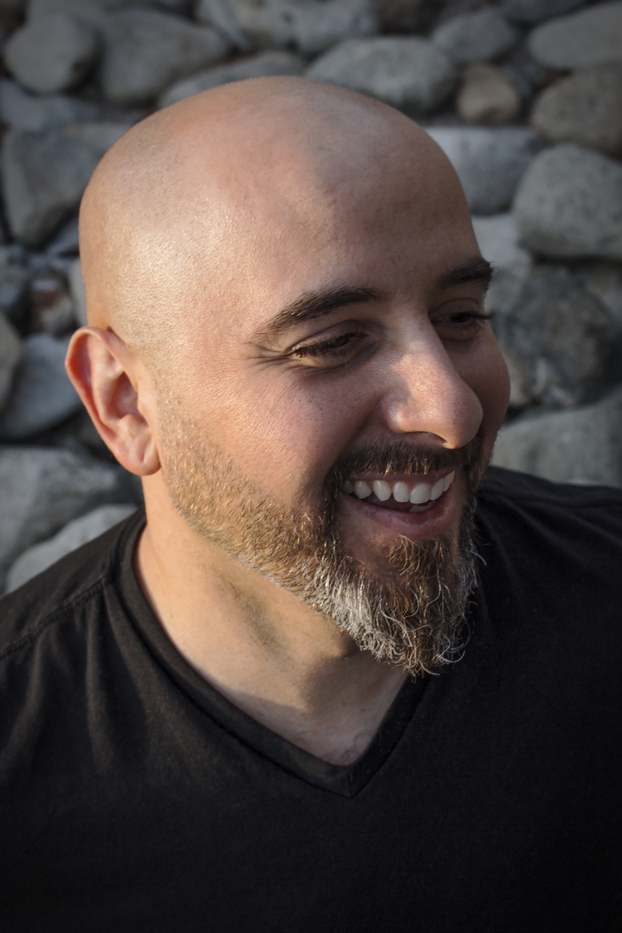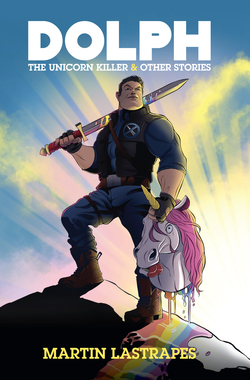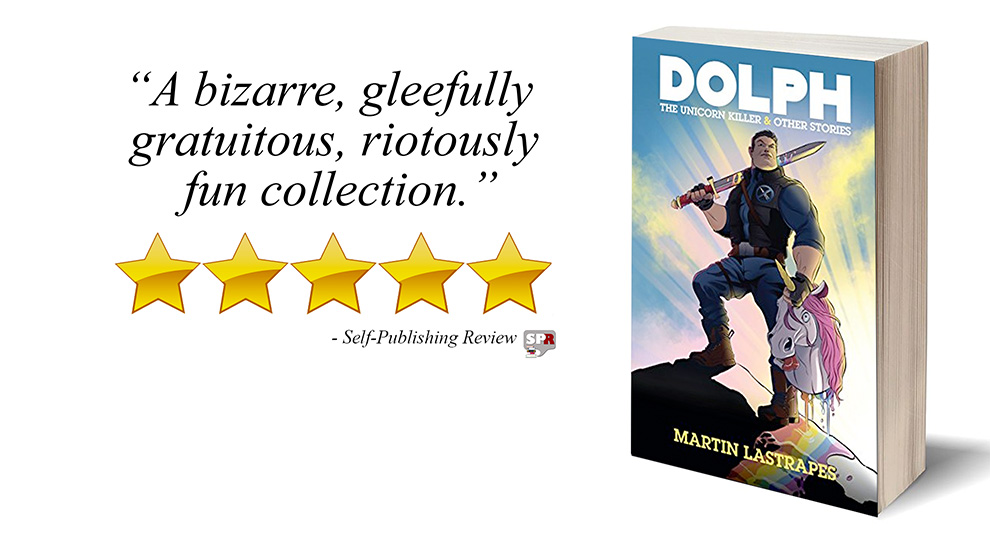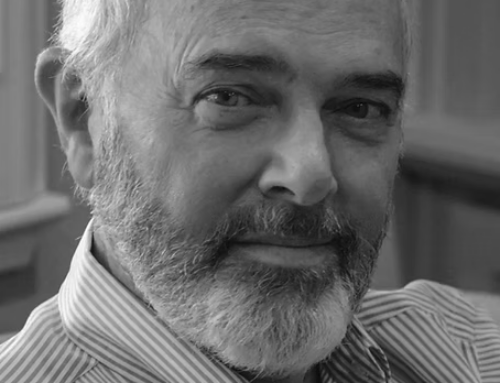 Martin Lastrapes is a bestselling and award-winning novelist. He is also the host of “The Martin Lastrapes Show Podcast Hour.” He studied at Cal State San Bernardino, where he earned a bachelor’s degree in English and a master’s degree in Composition. It’s his life goal to never be punched in the face.
Martin Lastrapes is a bestselling and award-winning novelist. He is also the host of “The Martin Lastrapes Show Podcast Hour.” He studied at Cal State San Bernardino, where he earned a bachelor’s degree in English and a master’s degree in Composition. It’s his life goal to never be punched in the face.
Tell us about your book.
Dolph the Unicorn Killer & Other Stories is a gloriously vulgar, gut-punching, giddy-inducing collection of interconnected horror, fantasy, comedy, and literary stories that weaves together an eclectic tapestry of characters who are bonded by themes of loneliness, revenge, friendship, and sex. It’s vampires, serial killers, unicorns, and more, all of them intersecting within that alluring stretch of the American Southwest known as Las Vegas.
Why did you want to write a book?
I love telling stories. It’s probably my favorite thing to do, outside of being told a great story.
Why did you choose to self-publish?
I love the freedom self-publishing offers, such as overseeing the creation of the cover art and deciding the publication date. I also love telling myself “yes,” instead of letting agents and publishers tell me “no.”
What tools or companies did you use, and what experience did you have?
The cover art was done by Ninjabot (aka Arnel Baluyot). Working with Ninjabot was amazing and the cover he created goes way beyond my wildest expectations. The interior, back cover, and spine were designed by AuthorSupport.com. This is my fifth book that AuthorSupport.com has helped design and I can’t say enough good things about them. The ebook was designed by my co-publisher Exciting Press. They handle everything on the digital end for Dolph the Unicorn Killer & Other Stories and they’re absolutely amazing. As for the printing and distribution, I use Lightning Source for all of my books.
Would you self-publish again?
Yes, absolutely.
What do you think are the main pitfalls for indie writers?
The main pitfall for any indie writer is trying to do everything yourself, particularly things you don’t have the skillset to pull off (like, for instance, a book cover). This generally comes as a result of wanting to spend as little money as possible on your book. But, when you try to do things you don’t have the skills to pull off, your book comes off looking amateurish. Along these same lines, another big pitfall is asking friends or family for favors that they’re not qualified to provide. It may sound harsh, but if you ask amateurs to work on your book then don’t be shocked with the final result.
 What tips can you give other authors looking to self-publish?
What tips can you give other authors looking to self-publish?
First, find people who’ve done it and ask lots of questions. If you don’t know anybody who’s done it, then feel free to ask me as many questions as you like (shoot me an email at martin.lastrapes@gmail.com). Also, be willing to invest some money into the publication of your book. This doesn’t mean you have to empty your bank account, but, by the same token, self-publishing doesn’t mean “free” publishing. It means you’re taking on the role of a traditional publisher and traditional publishers spend money. If you’re having trouble justifying the cost of a great cover or an amazing editor, then it’s worth asking yourself how serious you are about publishing your book.
What was your steepest learning curve during the publishing process?
Marketing. This is a mystery that I’m still trying to solve. I’ve had stretches where I think I’ve figured it out and I’ve had dry spells where absolutely nothing seems to work.
As a writer, what is your schedule? How do you get the job done?
I don’t keep a strict writing schedule. The goal I give myself is to write one new sentence every day. Sometimes that sentence turns into a paragraph, then a page, then several pages and, just like that, I’m off to the races. And sometimes that sentence is just a sentence and my writing is done for the day. But, I know that if I write one new sentence every day, then whatever book I’m working on will eventually get done.
How do you deal with writer’s block?
The main way I deal with writer’s block is by not believing in it. Writers are never actually blocked, as that would imply they have no words in their head (and, by the way, if you have no words in your head, then writing is the least of your concerns). What most writers think of as writer’s block is actually insecurity. They’re afraid of writing something bad, so they choose to write nothing at all. But, even if you have no idea what to write, you still have the ability to put words on the page. If you don’t know what your character should say next, let them describe what they had for breakfast or the best way to wash a car. If you don’t know what the next scene should be about, then write about your first kiss or your worst job interview. As long as you’re writing anything, you’ll eventually discover gold on the page.
Tell us about the genre you wrote in, and why you chose to write this sort of book.
Dolph the Unicorn Killer & Other Stories is a short-story collection, which I sort of fell into mostly by accident. I’d been feeling pretty uninspired and I didn’t know how to get my mojo back. So, I decided to go back to basics, which, for me, was writing short stories. It wasn’t my intention to publish any of the stories I was writing, but, well, we know how that turned out.
Who are your biggest writing inspirations and why?
Tom Robbins is a big one for me. So are Tim O’Brien, Chuck Palahniuk, and Michael Chabon. James Brown (not to be confused with the Godfather of Soul) is an immeasurably profound influence. They’ve all inspired me in different ways, but what they have in common is they’ve written books that absolutely moved me. Books that made me laugh or cry or sit in awe at the power of their prose. The inspiration comes from wanting to write books of my own that might affect someone else in the same way.
How do your friends and family get involved with your writing? What do they think of your book?
They’re all super supportive, though my books tend to make them blush or just generally question my sanity. My mom regularly tells strangers at Costco all about my books, so don’t be surprised if she pops up next time your sampling a smoothie.
What are your plans now your book is published?
Once one book is done, the plan is always to start working on the next one.
Why did you write about this particular subject?
I felt like there was a lack of representation for unicorn killers in mainstream media.
What did you learn on your journey as an author?
I learned that strangers will say very nice things about you on the Internet if they like your book. I also learned that the opposite is true.
What’s next for you as an author?
I’m currently working on a fantasy novel set in the circus. I’d also like to eat more pizza and binge-watch “New Girl.”
Author Links
Get an Editorial Review | Get Amazon Sales & Reviews | Get Edited | Get Beta Readers | Enter the SPR Book Awards | Other Marketing Services























Leave A Comment